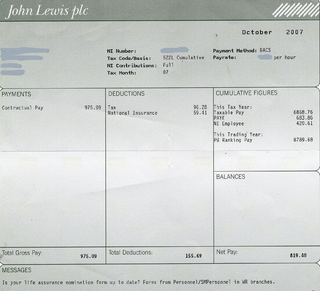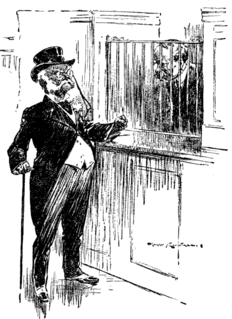Related Research Articles
A transaction account, also called a checking account, chequing account, current account, demand deposit account, or share draft account at credit unions, is a deposit account held at a bank or other financial institution. It is available to the account owner "on demand" and is available for frequent and immediate access by the account owner or to others as the account owner may direct. Access may be in a variety of ways, such as cash withdrawals, use of debit cards, cheques (checks) and electronic transfer. In economic terms, the funds held in a transaction account are regarded as liquid funds. In accounting terms they are considered as cash.

Cheque clearing or bank clearance is the process of moving cash from the bank on which a cheque is drawn to the bank in which it was deposited, usually accompanied by the movement of the cheque to the paying bank, either in the traditional physical paper form or digitally under a cheque truncation system. This process is called the clearing cycle and normally results in a credit to the account at the bank of deposit, and an equivalent debit to the account at the bank on which it was drawn, with a corresponding adjustment of accounts of the banks themselves. If there are not enough funds in the account when the cheque arrived at the issuing bank, the cheque would be returned as a dishonoured cheque marked as non-sufficient funds.
Bank fraud is the use of potentially illegal means to obtain money, assets, or other property owned or held by a financial institution, or to obtain money from depositors by fraudulently posing as a bank or other financial institution. In many instances, bank fraud is a criminal offence. While the specific elements of particular banking fraud laws vary depending on jurisdictions, the term bank fraud applies to actions that employ a scheme or artifice, as opposed to bank robbery or theft. For this reason, bank fraud is sometimes considered a white-collar crime.
Cheque fraud, or check fraud, refers to a category of criminal acts that involve making the unlawful use of cheques in order to illegally acquire or borrow funds that do not exist within the account balance or account-holder's legal ownership. Most methods involve taking advantage of the float to draw out these funds. Specific kinds of cheque fraud include cheque kiting, where funds are deposited before the end of the float period to cover the fraud, and paper hanging, where the float offers the opportunity to write fraudulent cheques but the account is never replenished.
A check verification service provides businesses or individuals with either the ability to check the validity of the actual check or draft being presented, or the ability to verify the history of the account holder, or both.

A cheque, or check, is a document that orders a bank to pay a specific amount of money from a person's account to the person in whose name the cheque has been issued. The person writing the cheque, known as the drawer, has a transaction banking account where their money is held. The drawer writes the various details including the monetary amount, date, and a payee on the cheque, and signs it, ordering their bank, known as the drawee, to pay that person or company the amount of money stated.
A cashier's check is a check guaranteed by a bank, drawn on the bank's own funds and signed by a cashier. Cashier's checks are treated as guaranteed funds because the bank, rather than the purchaser, is responsible for paying the amount. They are commonly required for real estate and brokerage transactions.
In economics, float is duplicate money present in the banking system during the time between a deposit being made in the recipient's account and the money being deducted from the sender's account. It can be used as investable asset, but makes up the smallest part of the money supply. Float affects the amount of currency available to trade and countries can manipulate the worth of their currency by restricting or expanding the amount of float available to trade.

A paycheck, also spelled pay check or pay cheque, is traditionally a paper document issued by an employer to pay an employee for services rendered. In recent times, the physical paycheck has been increasingly replaced by electronic direct deposits to the employee's designated bank account or loaded onto a payroll card. Employees may still receive a pay slip to detail the calculations of the final payment amount.
A chargeback is a return of money to a payer of some transaction, especially a credit card transaction.

An overdraft occurs when money is withdrawn from a bank account and the available balance goes below zero. In this situation the account is said to be "overdrawn". If there is a prior agreement with the account provider for an overdraft, and the amount overdrawn is within the authorized overdraft limit, then interest is normally charged at the agreed rate. If the negative balance exceeds the agreed terms, then additional fees may be charged and higher interest rates may apply.
A banker's draft is a cheque provided to a customer of a bank or acquired from a bank for remittance purposes, that is drawn by the bank, and drawn on another bank or payable through or at a bank.
In banking, a post-dated cheque is a cheque written by the drawer (payer) for a date in the future.
A bad check restitution program (BCRP) is a program in the United States that works to retrieve funds from bad check writers in order to repay moneys owed to the recipients of the checks. In other words, these are debt collection operations. Many of these programs are operated by private companies that add fees that may exceed $200, regardless of the amount of the check. They call these operations "bad check enforcement," or "bad check restitution," or "bad check diversion." Sometime, these programs are actually run in house by real prosecutors. The private companies send check writers letters which state basically, that to avoid being prosecuted, the check writer may enroll in an expensive diversion program. In most instances, the prosecution threats are false and made only to coerce payment of high fees.

Check kiting or cheque kiting is a form of check fraud, involving taking advantage of the float to make use of non-existent funds in a checking or other bank account. In this way, instead of being used as a negotiable instrument, checks are misused as a form of unauthorized credit.
A collection item is an item presented to a bank for deposit that the bank will not, under its procedures, provisionally credit to the depositor's account or which the bank cannot provisionally credit to a depositor's account. Collection items do not create float. Payment must be received from the payor bank before the item may be credited to the depositor's account.

In financial transactions, a warrant is a written order by one person that instructs or authorises another person to pay a specified recipient a specific amount of money or supply goods at a specific date. A warrant may or may not be negotiable and may be a bearer instrument that authorises payment to the warrant holder on demand or after a specific date. Governments and businesses may pay wages and other accounts by issuing warrants instead of cheques.
Negotiable Instruments Act, 1881 is an act in India dating from the British colonial rule, that is still in force largely unchanged.
A deposit account is a bank account maintained by a financial institution in which a customer can deposit and withdraw money. Deposit accounts can be savings accounts, current accounts or any of several other types of accounts explained below.

Canada Trustco Mortgage Co v Canada, is a significant case of the Supreme Court of Canada on the intersection of the Income Tax Act and the Bills of Exchange Act and the ability to seize funds that have been deposited by a debtor into an account held at a financial institution in Canada.
References
- 1 2 Larson, Aaron (18 August 2016). "What to Do if You Receive a Bad Check". ExpertLaw. Retrieved 29 September 2017.
- 1 2 Ward, Paul (2010). Tort Law in Ireland. Kluwer Law International, 2010. p. 129. ISBN 9041133321 . Retrieved 29 September 2017.
- ↑ "Anatomy of a Substitute Check" (PDF). Federal Reserve Banks. 2004. Retrieved 29 September 2017.
- ↑ Wood, Leslie (2005-06-29). "DA explains consequences of writing bad checks in Gallup". Independent. Archived from the original on 22 April 2008. Retrieved 2008-05-09.
- ↑ See, e.g., "Bad Check Questions". Hall County, Georgia. Retrieved 28 January 2019.
- ↑ "THE NEGOTIABLE INSTRUMENTS ACT, 1881 ACT NO. 26 OF 1881". 1881.
- ↑ "The legal consequences with bounced cheques! - Yahho India Finance".
- ↑ Clancy, Rebecca (2013-01-01). "UAE stops jailing expats for bounced cheques". The Telegraph. Retrieved 2013-05-22.
- ↑ "Bounced cheques yield libel damages". The Independent . 21 July 1992. Retrieved 2009-09-24.
- ↑ Ackland, Richard (6 August 2010). "Cheques and free speech get bounced - Aktas v. Westpac". Sydney Morning Herald. Retrieved 13 June 2014.
- ↑ King Jr., Martin Luther (2020-08-08). "Martin Luther King Jr. | I Have a Dream | delivered 28 August 1963, at the Lincoln Memorial, Washington D.C." American Rhetoric. Retrieved 2020-09-06.